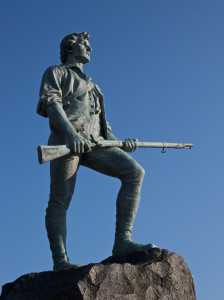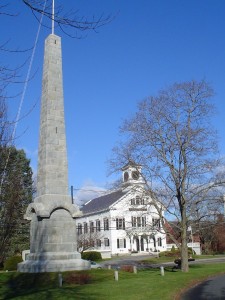Posted by Roberta Grimes • April 12, 2014 • 1 Comment
Book Quotes, The American Revolution, Thomas Jefferson
My Thomas is about the American Revolution. It is a true story of the kind of love that few of us ever manage to find, and a carefully researched examination of the formative years of one of America’s Founding Fathers, but at its heart it is the tale of a group of people who mutually pledged “our Lives, our  Fortunes, and our sacred Honor” to the fight for their freedom. They risked it all.
Fortunes, and our sacred Honor” to the fight for their freedom. They risked it all.
It is difficult for us now to imagine what a new thing that fight for freedom was. The American Revolution was the first time in history that any colony had attempted to throw off its parent country, and the grievances on which the Revolution was based were by most standards slight. Those at the front of the fight – the young Jeffersons included – were proud to consider themselves to be Englishmen. So why did they risk their lives and everything they had to throw off what was such a modest yoke that two other British colonies – Canada and Australia – are still sort-of members of the British Commonwealth today? Why did the American Revolution happen?
I wondered about that more and more as I researched Thomas Jefferson’s early life and wrote My Thomas. The public words that Thomas speaks in the novel are from his contemporary writings, and as you read them you can see that at first he didn’t expect bloodshed. He saw the colonists as simply claiming their natural rights as Englishmen when they decided to throw off a relationship with England that they had outgrown. As the colonists begin to claim their rights, and as the parent country objects, you see the Revolution developing as a kind of colossal misunderstanding. More than once I wanted to tell them all just to sit around a table and work this out!
So on the surface the American Revolution might be seen as the result of an escalating series of affronts and responses, with each side indignant that the other is being unreasonable. But you realize as you read Thomas Jefferson’s early writings that it was always more than that.
The whole of Western history had been trending away from the collective and toward the individual for at least the past eighteen hundred years. Personally, I find the seed of British America’s desire for freedom in its Christian roots, and in the moment when Jesus first urged us to throw off religious  authority and approach God directly: “But when you pray, go into your room, close the door and pray to your Father, who is unseen. Then your Father, who sees what is done in secret, will reward you.” (MT 6:6) When you are told that you don’t need religious masters, then the eventual realization that you don’t need secular overlords either is inevitable.
authority and approach God directly: “But when you pray, go into your room, close the door and pray to your Father, who is unseen. Then your Father, who sees what is done in secret, will reward you.” (MT 6:6) When you are told that you don’t need religious masters, then the eventual realization that you don’t need secular overlords either is inevitable.
But freedom is not free. To quote Martha Jefferson in My Thomas, “Only those can be free who insist with their lives that they must be free.”
Ralph Waldo Emerson was asked to write a hymn to be sung at the dedication of the Revolutionary Battle Monument in Concord, Massachusetts, on July 4, 1837. I loved his Concord Hymn as a child, and even today it can make me teary.
By the rude bridge that arched the flood,
Their flag to April’s breeze unfurled,
Here once the embattled farmers stood
And fired the shot heard round the world.
The foe long since in silence slept;
Alike the conqueror silent sleeps;
And Time the ruined bridge has swept
Down the dark stream which seaward creeps.
On this green bank, by this soft stream,
We set today a votive stone;
That memory may their deed redeem,
When, like our sires, our sons are gone.
Spirit, that made those heroes dare
To die, and leave their children free,
Bid Time and Nature gently spare
The shaft we raise to them and thee.
Sounds fascinating. I love history and I love historical fiction.